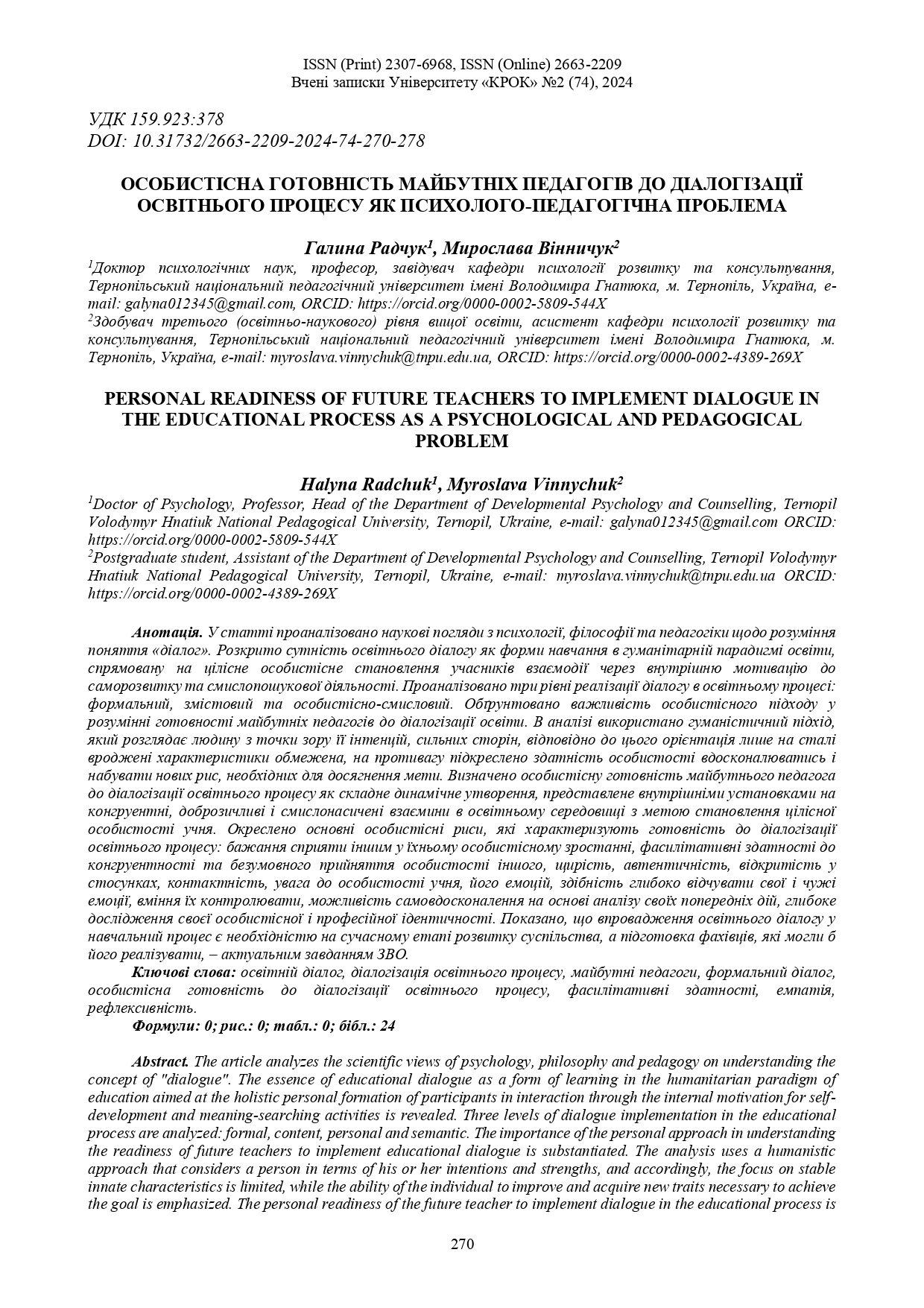PERSONAL READINESS OF FUTURE TEACHERS TO IMPLEMENT DIALOGUE IN THE EDUCATIONAL PROCESS AS A PSYCHOLOGICAL AND PEDAGOGICAL PROBLEM
DOI:
https://doi.org/10.31732/2663-2209-2024-74-283-291Keywords:
educational dialogue, implementing dialog in the educational process, future teachers, formal dialogue, personal readiness to implement dialogue in the educational process, facilitative abilities, empathy, reflexivityAbstract
The article analyzes the scientific views of psychology, philosophy and pedagogy on understanding the concept of "dialogue". The essence of educational dialogue as a form of learning in the humanitarian paradigm of education aimed at the holistic personal formation of participants in interaction through the internal motivation for self-development and meaning-searching activities is revealed. Three levels of dialogue implementation in the educational process are analyzed: formal, content, personal and semantic. The importance of the personal approach in understanding the readiness of future teachers to implement educational dialogue is substantiated. The analysis uses a humanistic approach that considers a person in terms of his or her intentions and strengths, and accordingly, the focus on stable innate characteristics is limited, while the ability of the individual to improve and acquire new traits necessary to achieve the goal is emphasized. The personal readiness of the future teacher to implement dialogue in the educational process is defined as a complex dynamic formation, represented by internal attitudes towards congruent, well-intentioned and meaningful relationships in the educational environment to form a holistic personality of the student. The main personal features that characterise the readiness to implement dialogue in the educational process are outlined: the desire to assist others in their personal growth, facilitative abilities to congruence and unconditional acceptance of the other's personality, sincerity, authenticity, openness in relationships, contact, attention to the student's personality, emotions, the ability to deeply feel one's own and other people's emotions, the ability to control them, the possibility of self-improvement based on the analysis of one's previous actions, a deep study of one's personal and professional identity. It is shown that the implementation of educational dialogue in the educational process is a necessity at the present stage of society's development, and the training of specialists who could implement it is an urgent task of higher education institutions.Downloads
References
Глуговська, О. М. & Сингаївська, І. В. (2023). Роль психологічної компетентності вчителів для надання підтримки учням в умовах війни. Держава, регіони, підприємництво: інформаційні, суспільно-правові, соціально-економічні аспекти розвитку: тези доповідей V Міжнародної конференції (Київ, 7 грудня 2023 р.). Київ: Університет "КРОК". https://conf.krok.edu.ua/SRE/SRE-2023/paper/view/1698
Засєкіна, Л. & Майструк, В. (2017). Безумовне самоприйняття та психологічне благополуччя особистості. (11), 187–192. http://nbuv.gov.ua/UJRN/NiO_2017_11_27
Карпенко, З. (2018). Аксіологічна психологія особистості (2-ге вид.). ДВНЗ «Прикарпатський національний університет імені Василя Стефаника». http://hdl.handle.net/123456789/3408
Кремень, В. (2015). Синергетична модель розвитку освіти. Проблеми освіти, 7–15.
Моначин, І. & Попик, Т. (2016). Сутність поняття психологічної готовності до діяльності. Актуальні задачі сучасних технологій: Матеріали V Міжнар. науково-техн. конф. молодих уч. та студентів, 17–18 листоп. 2016 р. Тернопіль, 351–352. http://elartu.tntu.edu.ua/handle/123456789/20055
Паркулаб, О. (2020). Терапевтичний діалог як співтворчість консультанта і клієнта. Габітус, (15), 187–197. https://doi.org/10.32843/2663-5208.2020.15.31
Радчук, Г. (2014). Аксіопсихологія вищої школи. ТНПУ.
Радчук, Г. (2017). Освітній діалог як інноваційна гуманітарна технологія професійного становлення особистості у вищих навчальних закладах. Педагогічний процес: теорія і практика, 1(56), 15–21. http://nbuv.gov.ua/UJRN/pptp_2017_1_4
Радчук, Г., & Адамська, З. (2019). Особистісна готовність викладачів вищої школи до діалогізації освітнього процесу. Humanitarium, 43(1), 122–130. https://doi.org/10.31470/2308-5126-2019-43-1-122-130
Радчук, Г., & Вінничук, М. (2023). Рефлексивність як професійно значуща якість майбутніх педагогів. Українська психологія. ХХІ століття. Початок. (Дні української психології в Берліні) : Матеріали науково-практ. конф. з міжнар. участю, м. Київ, 27–28 квіт. 2023 р. Київ, 539–543. http://doi.org/10.33120/UPS21Proceedings-2023
Саух, П., & Саух, Ю. (2015). Гуманітарна парадигма як життєдайна платформа сучасної освіти. Концептуальні засади професійного розвитку особистості в умовах євроінтеграційних процесів, 483–495. http://eprints.zu.edu.ua/id/eprint/19169
Сингаївська, І. В. (2021). Особливості формування професійної компетентності майбутніх викладачів психологічних дисциплін. Освіта та наука: трансформація, відповідальність, академічна свобода: матеріали наукової конференції (м. Київ, 5 березня 2021 р.). Київ. 137–139.
Слободянюк, О. (2019). Діалогізація освітнього середовища: Витоки і перспективи. Humanitarium, 43(1), 142–150. https://doi.org/10.31470/2308-5126-2019-43-1-142-150
Чепелєва, Н., Смульсон, М., Рудницька, С., Зазимко, О., Лебединська, І., Шиловська, О., Зарецька, О. (2019). Дискурсивні технології самопроектування особистості: (Н. Чепелєва, Ред.). Інститут психології імені Г. С. Костюка НАПН України. http://lib.iitta.gov.ua/717132/
Шулдик, А., & Шулдик, Г. (2022). Структура та рівні прояву емпатії у педагогів. Виклики сучасної психологічної науки країн ЄС: Перспективи інтеграції українського досвіду : зб. тез методол. семінару з міжнар. участю, м. Київ-Умань, 26 верес. 2022 р. Київ, С. 90–93. http://surl.li/ojfbd
Ярая, Т. (2014). Особистісна готовність майбутніх психологів до професійної діяльності в умовах інклюзивної освіти. Автореф. дис. канд. психол. наук, Національний педагогічний університет імені М.П.Драгоманова. http://enpuir.npu.edu.ua/handle/123456789/5782
Fomin, K. (2020). Criteria, indicators and levels of research of future teachers' readiness for organization of dialogic teaching for primary school students. Journal of Vasyl Stefanyk Precarpathian National University, 7(1), 112–121. https://doi.org/10.15330/jpnu.7.1.112-121
Higher education in the twenty-first century: Vision and action, v. 1: Final report. (1998). In World conference on higher education in the twenty-first century: Vision and action. UNESCO.
Kupiec, H. (2020). Znaczenie relacji dialogicznej w rozwijaniu kompetencji komunikacyjnych studentów pedagogiki. Kwartalnik Naukowy Fides Et Ratio, 42(2), 77–91. https://doi.org/10.34766/fetr.v42i2.266
Längle, A. (2011). The existential fundamental motivations structuring the motivational process. In Motivation, Consciousness and Self-Regulation (pp. 27–42). Nova Science Publishers, Inc.
Lederman-Daniely, D. (2016). Creation of the ‘sphere of the between’ in educational dialogue. Contemporary Education Dialogue, 13(2), 195–212. https://doi.org/10.1177/0973184916640404
Nolte-Laird, R. C. (2021). The sphere of between: Online dialogic encounters for positive peace. Thesis, Doctor of Philosophy. University of Otago. http://hdl.handle.net/10523/10785
Oleś, P. K., & Puchalska-Wasyl, M. (2011). Dialogicality and personality traits. In Handbook of Dialogical Self Theory (pp. 241–252). Cambridge: Cambridge University Press.
Rogers, C. R., & Freiberg, H. J. (1994). Freedom to learn (3rd ed). Merrill.
Sloman, S., & Fernbach, P. (2018). Knowledge illusion: The myth of individual thought and the power of collective wisdom. Pan Macmillan.
Williams, J. (2012). Beliefs, behaviours, and professional development of tutors in problem-based learning. Erasmus University Rotterdam. http://hdl.handle.net/1765/31100

Downloads
Published
How to Cite
Issue
Section
License

This work is licensed under a Creative Commons Attribution-NonCommercial 4.0 International License.

